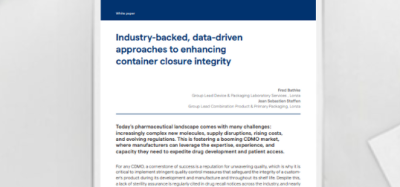Mayor of London considers £10bn ‘megafund’ as option to boost drug development
Posted: 25 June 2015 |
Plans to create a £10bn megafund that would make it easier for drug development will be discussed at a conference hosted by the Mayor of London’s Office…


Plans to create a £10bn ‘megafund’ that would make it easier for pharmaceutical companies in London and across the UK to develop ground-breaking new drugs and treatments is one of a number of options that will be discussed today at a special conference hosted by the Mayor of London’s Office.


The Mayor of London, Boris Johnson, believes that a radical new approach to life sciences investment is needed if London and the rest of the country is to maximise the full economic and health benefit of its world-leading research and development base.
Against that backdrop, today’s City Hall event will bring together leading figures in industry, finance and research. They will discuss positioning London as a test bed for innovative new funding models that tackle structural problems within life sciences investment and create a large pool of patient capital that supports long-term drug development and company growth.
Experts from organisations including Lilly, Pfizer, Imperial Innovations, Silicon Valley Bank, European Investment Bank and JP Morgan will explore options. These include the potential to establish a ‘megafund’ of up to £10bn created by a mix of debt and equity finance. Another option up for consideration today is to take advantage of a programme set up jointly by the European Commission and the European Investment Bank that is set to make more than €24 billion available over the next seven years.
The meeting is being hosted by the Mayor’s Office in conjunction with MedCity, launched by the Mayor last year to drive forward life sciences research, development, entrepreneurship and commercialisation. The event is supported by the European Investment Bank, a major European funder of research, development and innovation investment.
Boris Johnson said, “London is one of the most powerful scientific discovery engines in the world, home to an incredible cornucopia of research, medical and financial pre-eminence. By hosting this conference we hope to harness our role as a global financial centre that will bring more life-saving drugs to market and deliver a huge boost to the economy.”
Eliot Forster, Executive Chair of MedCity, said, “If you compare the UK to other leading life sciences hubs, we are extremely competitive – we have huge innovation, creativity and entrepreneurial drive, and we are increasingly agile in translating exciting research into spin-out companies. Capital is a key ingredient that grows those companies and brings therapies to market, and at the moment we simply don’t have enough of it. If we want to develop another GSK or AstraZeneca, if we want to get a full return on the investment we put into our research base, and if we want better therapies more quickly, this is an issue we have to address.”
It can cost up to £15m to reach Phase II clinical trial results and £20m to reach small Phase III trial results
At the moment, UK companies face particular challenges in accessing finance at certain stages of development, including taking promising late-stage research into clinical development, and for phase III trials and beyond. It can cost up to £15m to reach Phase II clinical trial results and £20m to reach small Phase III trial results, and take an average of 10 to 15 years to bring a medicine to market. Drug discovery and development also has a high failure rate, meaning that it is perceived as a riskier prospect for investors compared to other technology sectors.
More large pools of capital to fund opportunities in the sector and more long-term ‘patient’ investment are needed for the UK to develop a crucial tier of mid-sized life sciences companies, which it is currently lacking.
To tackle these challenges and create an environment in which life sciences companies can grow and successfully commercialise the UK’s cutting-edge research, today’s event will explore innovative new funding models for drug discovery and development.
These include establishing ‘megafunds’, potentially in the long run of up to £10bn, created using a mix of debt and equity finance that would be able to invest simultaneously in multiple different drugs at different stages of development. By pooling various drug development projects in a single investment portfolio, the overall risk would be lower, with a much higher chance of bringing a minority of successful projects to fruition, which would more than compensate for the potential failure of the remainder. This model is well known in the financial services sector, and one focus of today’s event will be to tackle the key differences in scale and complexity of life science.
A ‘megafund’ could bring together investors who would not normally invest in biomedical research and drug development. In return they could have a small percentage of the royalties from successful products or licensing revenues that result.
Another option would be to make use of the new InnovFin financing and advisory programme set up jointly by the European Commission and the European Investment Bank. The initiative helps to share best practice between innovation and life science focused companies seeking to attract public and private investment in life sciences. It is expected that InnovFin will provide more than £17 billion of new financing for research and innovation across Europe in the next five years.









